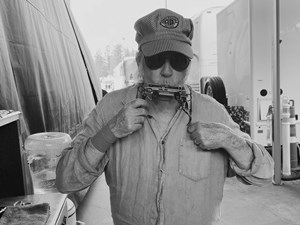The Zone of Interest Review
The
Zone of Interest
film opens in complete darkness. This moment is overscored with a
disorientating soundtrack - screams can be heard in warped music, creating a
deeply sinister affect. In this sense, Glazer immediately
creates the brutal tone that presides throughout the whole film,
which mainly plays out in the grounds of a house. The
house of Rudolf Höss (Christian Friedel), commandant of Auschwitz, and his wife
Hedwig (Sandra Hüller), mere meters from the concentration camp. The film
refuses to back down from the first second to the last. Despite this, we never
see the tragedy, the camera refuses to look over the concrete wall that
surrounds the protagonists’ living quarters.
The camp’s presence is heavily alluded to, but never seen, making us all
the more aware. There are moments of dialogue
which are presented as mundane, that feel horrifying to hear leave someone’s
mouth. Sandra Hüller gives a standout performance in this sense. It’s
a unique experience that's especially
worth having in a cinema. It feels visceral, intense, and importantly, unique.
There has long been a debate about how we ethically present the Holocaust in the media. One option is to avoid showing it all, think Lanzmann’s nine hour documentary Shoah (1985). The other option is to face the horror head on, sobering for those of us who have learnt about the holocaust with a degree of separation. However, I feel that it’s important to allow the voices of those persecuted to dominate the conversation. I feel similarly about The Zone of Interest. The film’s core concept, representing the everyday lives of these Nazis, has certainly been deemed disrespectful by some. But it’s important to note that at no point does Glazer ask you to sympathise with these characters. It’s an intense experience, to say the least, boarding on outright horror. The only difference is, you’re watching the villains. The cinema was silent as the film played out, no one daring to move an inch.
Holocaust Memorial Day fell at the end of January this year, which coincided with The Zone of Interest’s nomination for best picture at the Oscars. I feel that this signifies a small but important step in how we consume the holocaust in mainstream media. It's a vital watch which offers a radically new perspective, similar to The Grey Zone (Nelson, 2001), and Bent (Mathias, 1997).
It’s important that the Holocaust remains in mainstream consciousness, but I would also like to make the argument for highlighting smaller Jewish stories that lie outside of the tragedy. It would be satisfying to see recent features such as Shiva Baby (Speligman, 2020) and Attachment (Gislason, 2022) be recognised, in addition to holocaust narratives. It’s my hope that we continue to see films on the subject from different filmmakers’ perspectives, as well as all aspects of Jewish life represented on screen. But that, primarily, audiences remain open to listening to Jewish voices.


